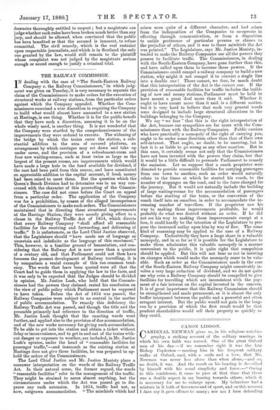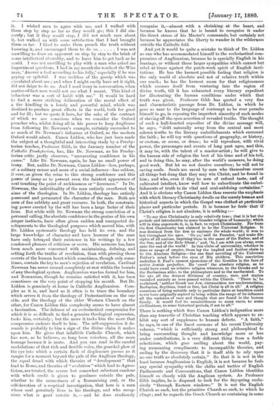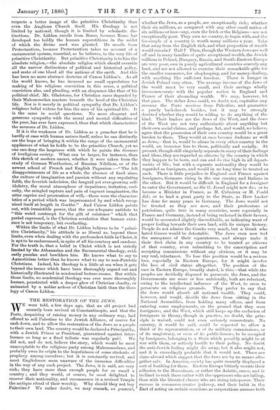CANON LIDDON.
CARDINAL NEWMAN gives us, in his religious autobio- graphy, a striking account of the solitary musings in which his own faith was nursed. One of the great Oxford men of his day — if we remember right it was the late Bishop Copleston — meeting him in his frequent solitary walks at Oxford, said, with a smile and a bow, that Mr. Newman was never less alone than when alone,—and so, no doubt, it was. And the result on his bearing is described by himself with his usual simplicity and force :—" Owing to this confidence, it came to pass at that time that there was a double aspect in my bearing towards others, which it is necessary for me to enlarge upon. My behaviour had a mixture in it both of fierceness and of sport, and on this account I dare say it gave offence to many ; nor am I here defending
it. I wished men to agree with me, and I walked with them step by step as far as they would go ; this I did sin- cerely; but if they would stop, I did not much care about it, but walked on with some satisfaction that I had brought them so far. I liked to make them preach the truth without knowing it, and encouraged them to do so I was not unwilling to draw an opponent on step by step to the brink of some intellectual absurdity, and to leave him to get back as he could. I was not unwilling to play with a man who asked me impertinent questions. I had in my mouth the words of the Wise man, ' Answer a fool according to his folly,' especially if he was prying or spiteful. I was reckless of the gossip which was circulated about me ; and when I might easily have set it right, did not deign to do so. And I used irony in conversation, when matter-of-fact men would not see what I meant. This kind of behaviour was a sort of habit with me." It would be hard to find a more striking delineation of the moral effect of a fire kindling in a lonely and powerful mind, which was destined to produce great effects in the world, both for good and for ill ; but we quote it here, for the sake of the contrast of which we are conscious when we consider the Oxford preacher who, whilst doing all in his power to keep Anglicans from following Dr. Newman's example, certainly succeeded to as much of Dr. Newman's influence at Oxford, as the modern Oxford would admit. Canon Liddon, who has just been made the subject of a thoughtful and interesting study by a Presby- terian teacher, Professor Gibb, in the January number of the Catholic Presbyterian, has, like Dr. Newman, as his Presby- terian critic justly observes, " unwavering confidence in his cause." Like Dr. Newman, again, he has no small power of irony. But, unlike Dr. Newman, Canon Liddon—less, perhaps, of a-solitary maser and more of a social influence—has seldom, if ever, so.given. the reins to this strong confidence and this power of irony'as to present even the faintest appearance of zeal-touching the point of recklessness or " fierceness." In Dr. Newman, the individuality of the man entirely overflowed the aims- of the theologian. In Dr. Liddon, theology has entirely poesessed and permeated the character of the man. Both are meti. of fine subtlety and great resource. In both, the constrain- ing`power exerted by the will has been a large factor of their lives. But while with Dr. Newman the strong conviction of a personal calling, the absolute confidence in the genius of his own deeper instincts, have often given sudden and unexpected de- velopraentd to the theological purposes which moved him, with Dr. Liddon systematic theology has held its own, and the large knowledge of character and keen humour of the man have only betrayed their existence in his writings by a few condensed phrases of criticism or scorn. His sermons too, have been much more concerned with maintaining, defining, and setting forth the truths of revelation, than with piercing those secrets of the human heart which sometimes, though only some- times, contain the key to men's rejection of revelation. Cardinal Newman has never seemed completely at rest within the bounds of any theological system. Anglicanism was too formal for him, and Romanism, though he remains satisfied with it, has been sometimes on the very point of stopping his mouth. But Dr. Liddon is genuinely at home in Catholic Anglicanism. Com- plex as it is, and hard as it often is to trace the boundary which severs it from the theology of Protestantism on the one side, and the theology of the older Western Church on the other, for Canon Liddon this complexity seems to have almost a fascination. The defence of an ecclesiastical compromise for which it is so difficult to find a genuine theological expression, tasks him, certainly ; but the more it tasks him the more that compromise endears itself to him. The self-suppression it de- mands is probably to him a sign of the divine claim it makes upon him. He gives that infallible Catholic Church, which has now, as he believes, so long been voiceless, all the more homage because it is mute. And you can read in the careful modulations of that rich and flexible voice, the guarded glow of the eye into which a certain flash of displeasure passes as it ranges for a moment beyond the pale of the Anglican theology, the equal dread with which theories of " development " that lead to Rome, and theories of " evolution" which lead to Agnos- ticism, are treated, the severe but somewhat reluctant candour with which credit is given to goodness outside the pale, whether to the earnestness of a Romanising zeal, or the self-devotion of a sceptical investigation, that here is a man whose soul genuinely lives in his theology, and who recog- nises what is good outside it, — and he does studiously recognise it,—almost with a shrinking- at the heart, and because he knows that he is bound. to recognise it under the direct stress of his Master's commands, but certainly not because he appreciates the liberty to wander in the wilderness outside the Catholic fold.
And yet it would be quite a mistake to think of Dr. Liddon as one who has accommodated himself to the ecclesiastical com- promises of Anglicanism, because he is specially English in his leanings, or without those larger sympathies which cannot but rebel at times against the patch-work spirit of English insti- tutions. He has the keenest possible feeling that religion is the only world of absolute and not of relative truth within our reach; he has the keenest scorn for that religiousness which excuses itself from venturing into the region of divine truth, till it has exhausted every literary expedient for illustrating the human conditions under which that truth was given. Professor Gibb has quoted a very fine and characteristic passage from Dr. Liddon, in which he goes as near to the language of contempt as he ever permits himself to go, in exposing the imperfect sincerity of such modes of staving off the open assertion of revealed truths. The thought of such a half-hearted expositor of the divine message will, he says, " drift naturally away from the central and most solemn truths to the literary embellishments which surround the faith ; he will toy with questions of geography, or history,
or custom, or scene, or dress ; he will reproduce, with vivid power, the personages and events of long past ages, and this, it may be, with the talent of a master-artist ; he will give to the human side of religion the best of his time and of his-toil, and in doing this, he may, after the world's measure, be doing good work. But let us not deceive ourselves; he will not be saving souls. Souls are saved by men who themselves count all things but dung that they may win Christ,: and be found in him ; and who, even if they be men of refined taste; and of cultivated intellect, know well how to subordinate- the embel- lishments of truth to its vital and soul-subduing-certainties." And it is obvious why Canon'Liddon thus resents-the emphasis with which' literary Christianity dwells on themerely Mona& and
historical aspects in which the Gospel was clothed at particular places and particular periods. It is -beeause. he feels -that -if Christ's religion is not absolute; it is nothing t-
" To say that Christianity is only relatively'true ; that it is-but the prelude and introduction to some broader religion of humanity; which will in time supersede it, is, in fact, to reject Christianity. For from' the first Christianity has claimed• to be the Universal• Religion. It was destined from the first to embrace the whole world ; it was- to last throughout the ages. Go ye,' said its Founder, and make dis- ciples of all nations, baptizing them in the name of the Father, and of the Son, and of the Holy Ghost ; ' and, lo, I am with you alway, even unto the end of the world.' In this claim of universality, whether in time or range of empire, there lay the implied and further claim to be the Absolute Religion—the one final unveiling of the Universal Father's mind before the eyes of His children. This. conviction underlies S. Paul's earnest apoetolate of the Gentiles in the face of active Jewish prejudice. He ' owed ' the absolute religion as he could have owed no relative religion whatever, to the-Greeks and to the Barbarians alike, to the philosophers and to the uneducated. To his eye all the deepest divisions of country, race, and station vanished entirely as men passed within the Church. There is,' he exclaimed, I neither Greek nor Jew, cirettmcision nor unciremneision, Barbarian, Scythian, bond or free, but Christ is all in all.' A religion conscious of being suitable only to particular dates or localities could never have originally aspired to bring within the range of its influence all the varieties of race and thought that are found in the human family. It would feel its unsuitableness to some races, to some civilizations, to some historical periods, if not to all."
There is nothing which fires Canon Liddon's indignation more than any travestie of Christian teaching which appears-to ex- hibit any sort of suppleness to human defects. "A faith," he says, in one of the finest sermons of his recent University volume, " which is sufficiently strong and philosophical to bring surrounding thought and knowledge more or less under contributions, is a very different thing from a feeble eclecticism, which goes smiling about the world, pay- ing unmeaning compliments to incompatible theories, and ending by the discovery that it is itself able to rely upon no one truth as absolutely certain." So that it is not in the least because Anglicanism is English, it is not because he feels any special sympathy with the shifts and tactics of English Parliaments and Convocations, that Canon Liddon identifies himself so closely with the Anglican system. As Professor Gibb implies, he is disposed to look for the dayspring exclu- sively " through Eastern windows." It is not the English
Church as such, but the primitive Church as such, to which he clings ; and he regards the Greek Church as containing in some
respects a better image of the primitive Christianity than even the Anglican Church itself. His theology is not limited by national, though it is limited by scholastic dis- tinctions. Dr. Liddon recoils from Rome, because Rome has developed too boldly the human superstitions in the midst of which the divine seed was planted. He recoils from Protestantism, because Protestantism takes no account of a sacramental system, essential, as he believes, to the very life of primitive Christianity. But primitive Christianity is to him the absolute religion,—the absolute religion which should override all the narrow distinctions of political and historical policy, and make of one blood all the nations of the earth. And this has been no mere abstract doctrine of Canon Liddon's. As all the world knows, he has incurred no small opprobrium for making of his religious conviction in this sense, a political conviction also, and pleading, with an eloquence like that of his political chief, Mr. Gladstone, for Christian races degraded by their Mahommedan masters beneath the level of the Christian life. Nor is it merely in political sympathy that Dr. Liddon's religions belief widens for him the area of his spiritual life. It is the same in social questions. No more eloquent and generous sympathy with the moral and mental difficulties of the poor, has ever been expressed, than that which characterises the sermons of Dr. Liddon.
If it is the weakness of Dr. Liddon as a preacher that he is hardly at ease with human nature itself, unless he can distinctly see the hope of bringing it within the range of the sacramental appliances of what he holds to be the primitive Church, yet no one can deny the largeness with which he paints the diseases of irreligious society. What can be larger, for instance, than this sketch of modern unrest, whether it were taken from the study of German Wertherism, of Russian Nihilism, or of the newest school of French and English Paganism :—" The felt disappointments of life as a whole, the absence of fixed aims, the culture of imagination and passion without any regulating faith, the feverish indecision, the languid yet ever-growing self- idolatry, the moral atmosphere of impatience, irritation, curi- osity, the mingled rapture and pain of vagrant imagination, the utter caprice and prostration of will,—these were the character- istics of a period which was impersonated by and which recog- nised itself at-length in Goethe." And Canon Liddon points out, with-irresistible power, that the one adequate antidote to " this weird contempt for the gift of existence" which that period expressed, is the Christian revelation that human exist- ence is not temporary, but everlasting.
Within the limits of what Dr. Liddon believes to be " primi- tive Christianity," his attitude is as liberal as, beyond these limits, even when dealing with the profoundest faith in Christ, it is apt to be embarrassed, in spite of all his courtesy and candour. For the truth is, that a belief in Christ which is not strictly limited by the Athanasian and the Sacramental theology, evid- ently putties and bewilders him. He knows what to say to Agnosticism better than he knows what to say to non-Patristic Christians. Indeed, his theology is a little at sea when it gets beyond the issues which have been thoroughly argued out and historically illustrated in academical lecture-rooms. But within those limits, no academical theology was ever more thoroughly human, penetrated with a deeper glow of Christian charity, or animated by- a nobler ardour of Christian faith than the theo- logy of Canon Liddon.




































 Previous page
Previous page